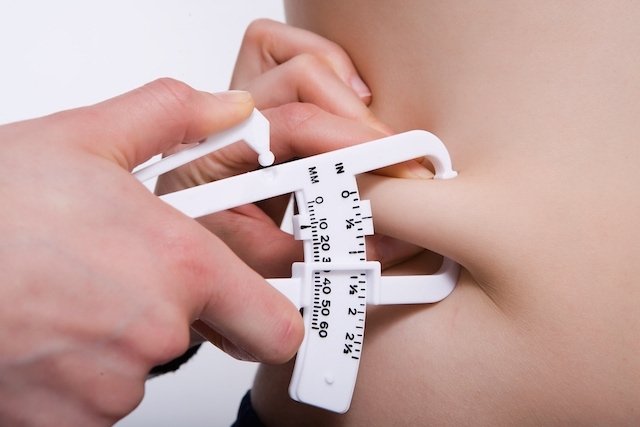The ideal body fat percentage, according to the American Council on Exercise, is 14 to 31% in women and 6 to 24% in men. This body fat index measures the amount of fat the body should contain to ensure optimal health and functioning.
In order to reduce and achieve an ideal body fat percentage, your should reduce your intake of high-fat and high-sugar foods, as well a exercise regularly and maintain a healthy diet.
A body fat percentage should be calculated by a registered dietitian, doctor, physical education teacher or other health professional, by assessing weight, waist circumference, body circumferences and waist circumference. However, there are methods that can be used at home, such as using a bioimpedance scale.

How to calculate body fat
Body fat percentage can be calculated using anthropometric measurements, bioimpedance or even body scanners, for example.
1. Anthropometric measurement
Anthropometric measurement is a technique used to calculate a person's body composition. A registered dietitian or other health professional measures specific circumferences and skinfolds in the areas with the most body fat, such as the abdomen, back, arms and thighs. To do this, an instrument called a caliper and a tape measure are used.
Once the measurements have been taken, there are prediction formulas in which the circumference and skinfold values are used, thus giving an estimate of body fat.
2. Bioimpedance scales
To calculate the body fat percentage, you can use bioimpedance scales, which indicate not only weight, but also the amount of water, muscle, bone mass and fat in the body. The scale takes into account the person's age, gender, height, weight and the intensity of the physical activity to estimate estimate fat, muscle and bone mass.
This measurement should preferably be done on an empty stomach and should not be done during pregnancy, after intense physical activity, during menstruation, nor 5 days before or after menstruation, as the values may be altered.
3. Other methods
There are other methods that also provide an estimate of body fat percentage, such as 3D body scanners, DEXA (Dual Energy X-Ray Absorptiometry), air displacement plethysmography and hydrostatic weighing, for example. However, these methods are more expensive and not easily accessible.
Ideal body fat percentages for men
Ideal body fat percentages for women
When the patient is over 60 years old, it is normal to have a body fat percentage that exceeds the ranges in this table. Therefore, registered dietitians will compare the measurement to current diet and physical activity level.
Maintaining body fat percentage within the normal values is important to guarantee optimal health, to protect the internal organs, and to regular normal body temperature.
How to lower body fat percentage
To lose weight and decrease body fat percentage or increase muscle mass, it is important to exercise on a regular basis at high intensity for at least 3 weeks. Examples include running and riding a bike. Some body types will also be more prone to retaining body fat - learn more about the endomorph, ectomorph and mesomorph body types.
Use the calculator below to find out your current BMI (body mass index) and to see if you are within the normal ranges:
